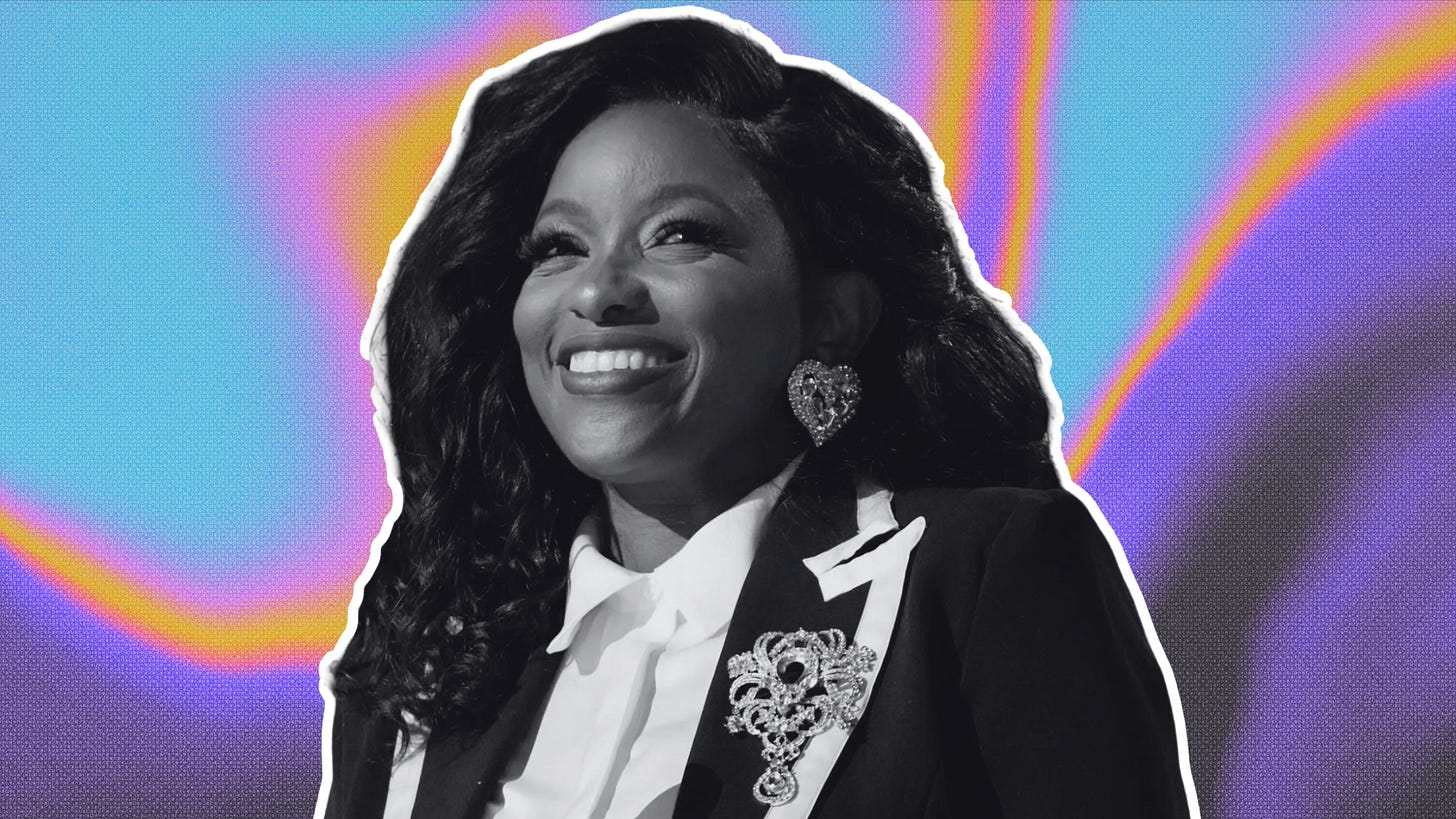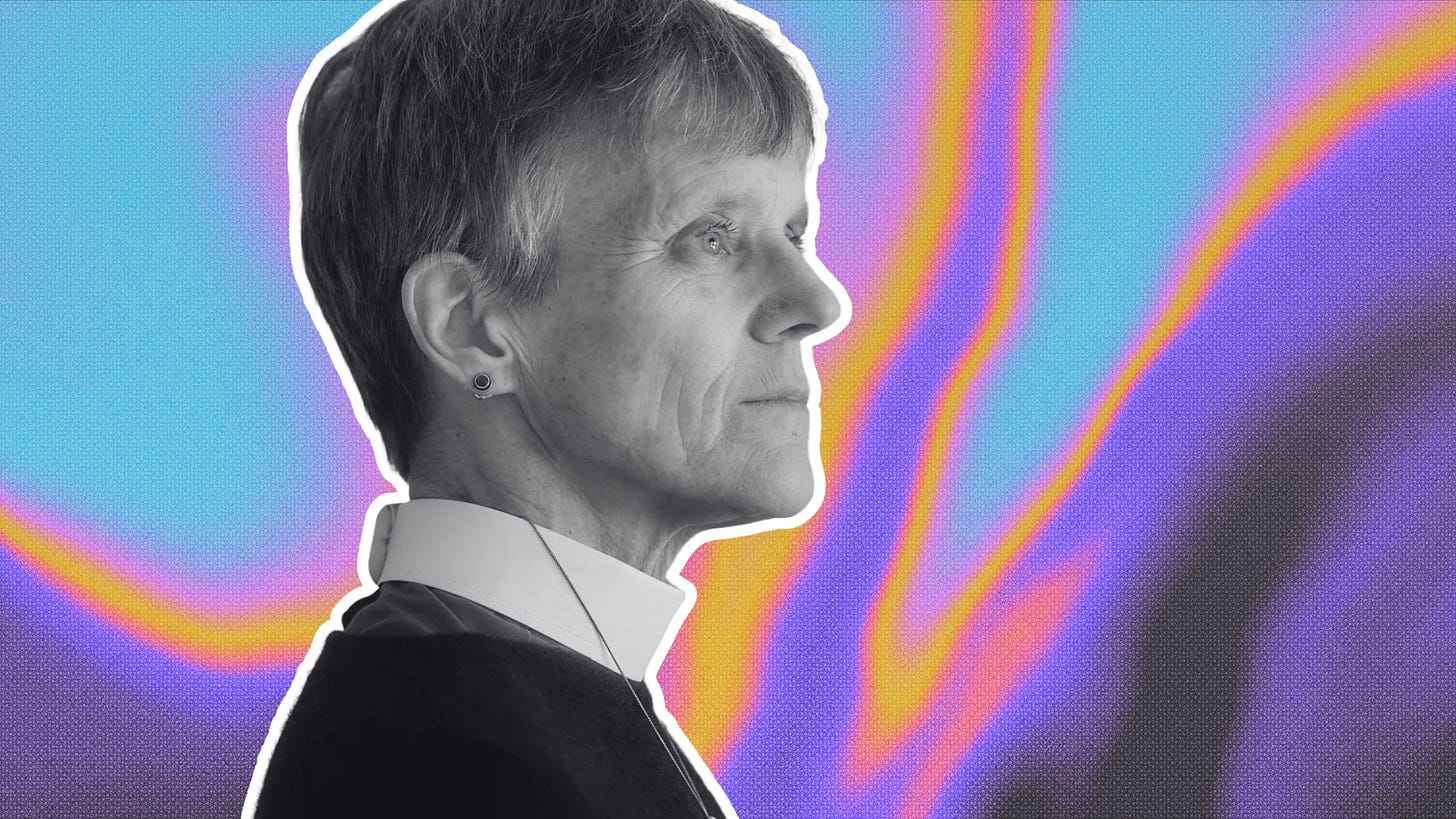The Girlboss Era Is Dead. Long Live the Revolution Queens
From AOC to Mamala herself. My Justice League is made up of the 5 new-gen women leaders who are rewriting the playbook on power and giving pure "burn-it-down-and-rebuild" energy.
Don't get me wrong, I'm all for women securing their bag. But somewhere between "lean in" and #buildbossbabeempire that feels more like a corporate PR campaign than actual progress, we have lost the plot on what actual female empowerment looks like.
My idea of modern-day warriors aren't the glossy Instagram "women supporting women" hashtag variety, but rather women who look at the rigid nature of society and the game of politics and decide not to just play it better—but to flip the whole damn table.
Women who can show that real power isn't about climbing the ladder of a broken system, but about building entirely new structures from the ground up.
Let me introduce you to my personal Justice League. The real kind. The kind you want in the trenches when freedom and democracy are gasping for air. Each of these women are thinkers, doers, and disruptors, and each of them has shown that power isn’t about ego or cruelty—it’s about using your voice, your mind, and your platform to serve others.
Alexandria Ocasio-Cortez: The Blueprint
→ Website | → Instagram | → Twitter | → Youtube | → Tiktok
We might as well start with Alexandria Ocasio-Cortez, most commonly referrenced as AOC, because no one electrifies a room—or a congressional hearing—quite like her. The youngest woman ever elected to Congress, she’s turned the House into her personal TED Talk stage, dragging corrupt CEOs and GOP hypocrisy with receipts that would make any auditor jealous.
I still remember the first time I saw Alexandria Ocasio-Cortez absolutely demolish a room full of crusty congressional oldtimers who thought they could mansplain financial regulations, dismissing her as “just a bartender.” Now that's the most accidentally brilliant origin story since Peter Parker got bit by a radioactive spider If you ask me. Queue my intrigue.
I instantly noticed that while her colleagues dodge questions in ivy-covered lecture halls, AOC masters the art of reading people, managing chaos, and delivering exactly what her audience needs—skills that turn out to be surprisingly transferable from serving drinks to serving justice in Congress.
More Than a Politician—A Cultural Shift
AOC represents something much bigger than just a progressive platform. She is a generational shift in what power looks like, how it’s wielded, and who gets to hold it.
In a system designed to turn idealists into cynics faster than you can say "campaign finance reform," she's somehow managed to keep her revolutionary spirit while mastering the machinery of change. When she grills a CEO about their company's labor practices, it's not just political theater—it's someone who actually knows what it's like to worry about making rent, holding the powerful accountable in real time.
The Art of the Congressional Roast
There’s a reason AOC’s questioning style has gone viral time and time again. While her colleagues are still reading pre-written scripts that sound like they were generated by ChatGPT's "boring, out of touch politician" mode, AOC builds her case methodically, laying trap after trap with the precision of someone who knows exactly what game these power players are running—because she's seen it from the other side of the bar.
She dissects complex issues like the Green New Deal or Medicare for All and instead of drowning us in policy-speak, she breaks it down like she's explaining why your tab is so high—direct, detailed, and with just enough spice to make you pay attention. When she talks about climate change, it's not just about numbers and projections—it's about our collective future, served straight up with no corporate chaser.
AOC has transformed the very language of politics. Gone are the days when politicians could hide behind jargon and procedural nonsense. AOC makes democracy accessible to generations that were told politics wasn't for them.
Why the Establishment Hates Her (And Why That’s a Good Thing)
There’s a reason both Republicans and centrist Democrats have spent so much time trying (and failing) to undermine AOC. She’s the walking, talking, legislating proof that their way—the status quo—isn’t just outdated, but actively harmful.
Republicans fear her because she shatters every stereotype they’ve relied on for decades. They want voters to believe that socialistic values are scary, that young progressives are clueless, that Latina women from working-class backgrounds aren’t meant to hold real power.
Meanwhile, corporate Democrats fear her because she exposes their game. She calls out how they cozy up to Wall Street while pretending to be for the people. She doesn’t just talk about progressive policies—she fights for them in ways that make their excuses look as flimsy as they are.
She refuses to wait her turn. She refuses to play nice with the billionaires funding both sides. She refuses to accept that that’s just how things are.
AOC’s Influence: The Future of Political Power
AOC doesn’t just speak truth to power—she shows what power looks like when it's wielded by someone who remembers what it's like to be powerless. Every time she steps into a hearing room or takes to social media, she's demonstrating that the future of politics doesn't belong to those born into power, but to those who understand how that power has failed us.
AOC has redefined what it means to be a public servant for the new age. She’s unapologetically bold, deeply informed, and unwilling to accept power as it is.
Jasmine Crockett: The Rising Firebrand
→ Website | → Instagram | → Twitter | → Youtube | → TikTok
Watching Jasmine Crockett demolish bad-faith arguments on the House floor feels like watching your smartest friend absolutely destroy that one guy at the party who won't stop mansplaining crypto. Except instead of crypto, it's voting rights. And instead of a house party, it's the actual House of Representatives.
When Jasmine Crockett stepped into Congress fresh from the Texas State Legislature, the old guard probably expected another rookie they could steamroll with their usual parliamentary gymnastics. Instead, they found themselves facing a civil rights attorney who'd spent years picking apart voter suppression tactics with surgical precision.
Competence Meets "Not Here for Your Nonsense"
Jasmine Crockett represents something we desperately need—what American politics has been starving for: competence with a side of zero f*cks given about maintaining the polite fiction that both sides are arguing in good faith.
The political playbook has always told marginalized voices—especially young Black women—to wait their turn, to speak softly, to not make waves. Jasmine Crockett respectfully declines and is instead surfing those waves straight into the history books.
We’ve all been told that "bipartisanship" often means compromising with people who'd rather not let you vote, but instead she's choosing radical honesty over comfortable lies. When her colleagues try to dress up voter suppression in suits and ties, she calls it what it is: the jim crow allegations are not allegations.
This is what happens when you combine generations of Black women's wisdom with a law degree, wrap it in millennial fearlessness, and set it loose in the halls of power.
Why Her Leadership Matters
For every young person who's been told they're "too much"—too loud, too direct, too uncompromising—Jasmine Crockett's presence in Congress just feels different. She's proof that you don't have to choose between being effective and being authentic, between making change and making noise.
She's what happens when preparation meets opportunity meets an absolute refusal to play small. She's what happens when we stop asking permission to take up space and start demanding accountability.
In a political moment where democracy is literally crashing out, we need more than just another polite voice of dissent. We need fighters who understand that civility without justice is just oppression with better manners. We need leaders who can translate between the language of law and the language of the people. We need Jasmine Crockett.
And for everyone clutching their pearls about "decorum" and "tradition"? Might want to loosen that grip. Because this isn't just a moment—it's a movement. And Jasmine Crockett is just getting started.
Kathleen Martinez: The Real Life Elle Woods
→ Website | → Instagram | → Youtube | → TikTok
Kathleen Martinez isn't just an immigration attorney; she's a one-woman cultural reset of what justice looks like in the digital age. While dusty law firms are still trying to figure out how to use LinkedIn, she's building a legal empire on TikTok, proving that you can fight deportations in the morning and drop viral content in the afternoon.
Let's be clear: comparing Kathleen Martinez to Elle Woods isn't just about the blonde hair and pink suits (though she rocks both with an unapologetic flair that makes corporate lawyers clutch their navy blazers in horror). It's about how she's taken everything we thought we knew about legal advocacy and turned it into something radically accessible, deeply human, and impossible to ignore.
Justice, But Make It Digital
Between trending sounds and perfectly-timed transitions, she's breaking down complex immigration law, debunking myths about DACA, and exposing the kafkaesque nightmare of immigration bureaucracy, all while building a community that turns legal education into a form of resistance. In a system designed to be as opaque as possible, Kathleen Martinez's transparency is truly refreshing.
Her approach to immigration law isn't just about winning cases, though she does plenty of that, it’s about recognizing that every client carries with them a universe of hopes, fears, and dreams that can't be reduced to case numbers and filing deadlines.
When she fights a deportation case, she's not just arguing legal precedents—she's fighting for families to stay together, for dreams to stay alive, for futures to remain possible.
And let's talk about her style, because it's not just aesthetic—it's political. In a profession that still largely expects women to shrink themselves into grey suits and muted tones, Kathleen Martinez's embrace of pink and her unfiltered commentary is nothing short of brilliance.
She's proving that you don't have to choose between being taken seriously and being authentically yourself, between being professional and being human.
A Lawyer Who Actually Gets It
Law is too often used as a weapon against the vulnerable, but Kathleen Martinez shows us what it looks like when legal expertise becomes a shield for the marginalized instead. She’s proving that justice doesn't have to be cold, intimidating, or exclusive. It can be accessible, human, and yes, even come with a side of perfectly executed trending sounds.
So don't let the social media savvy fool you. Behind every viral video is a lawyer who built her firm from scratch, turning it into a powerhouse for marginalized communities. While Big Law is busy gatekeeping legal knowledge behind mahogany doors and billable hours, Kathleen Martinez democratizes justice. She understands something fundamental: in a world where information is power, making legal knowledge accessible isn't just good marketing—it's a radical act of empowerment.
Mariann Budde: The Voice of Moral Courage
Most of us have a complicated relationship with organized religion, specifically Christianity. The church has felt more like a tool of oppression than a beacon of justice. But every now and then, someone steps up and reminds us that faith, at its core, was never meant to comfort the powerful—it was meant to challenge them.
Enter Bishop Mariann Budde, the woman who gave religion a redemption arc at the 2025 Inaugural Prayer Service, reminding us that sometimes the most radical act of faith is speaking truth to power while wearing a perfectly pressed surplice.
Remember June 2020? When Budde stood outside St. John's Church, her voice shaking with righteous anger as she condemned the use of tear gas on peaceful protesters for a photo op? That wasn't just a moment—it was foreshadowing. Fast forward to January 2025, and there she was again, this time at the National Cathedral, delivering what can only be described as a theological mic drop.
Why Mariann Budde’s Leadership Just Feels Different
The thing about Mariann Budde is that she gets it. While some religious leaders are still out here giving us thoughts and prayers in response to systemic injustice, she's giving us prophetic tradition with a side of "read the room."
When she quoted Amos—"Let justice roll down like waters, and righteousness like an ever-flowing stream"—she wasn't just reading scripture. She was essentially saying, nice inaugural address, but God's democracy agenda is a little more ambitious than yours.
The way she wove together references to historical movements for justice with contemporary struggles? Pure poetry. One minute she's invoking Dorothy Day and Martin Luther King Jr., the next she's subtly dragging current policies on immigration and economic inequality. And she did it all while maintaining that serene episcopal smile that says, I'm praying for you, but also, repent.
The Church of Accountability
Mariann Budde understands that religious leadership isn't about maintaining polite distance from politics—it's about recognizing that the gospel itself is political. Not in the Jesus definitely voted for my tax bracket way, but in the whatever you did for the least of these way that makes comfortable people squirm in their pews.
The fact that she chose to center her prayer around themes of collective responsibility and radical inclusion was the definitive act of courage and strength.
Today "religious freedom" often means the freedom to exclude and discriminate, but Mariann Budde proceeds to give us an inclusive theology that would make both Jesus and bell hooks proud.
And can we talk about the timing? The way she paused after each challenge to the status quo, letting the discomfort marinate? That wasn't just good public speaking—that was psychological warfare for justice. Each silence was filled with the weight of unspoken truths: about poverty, about racism, about the way we've twisted faith to serve power instead of people.
Reclaiming Faith
Some called it inappropriate. Others called it partisan. But real ones know it was simply prophetic—in the biblical tradition of speaking uncomfortable truths to comfortable people.
When she talked about the moral obligation to welcome the stranger, protect the vulnerable, and dismantle systems of oppression, she wasn't being political—she was being biblical. And if that makes some people uncomfortable, well, that's kind of the point.
For those of us who have felt alienated from religious institutions, Mariann Budde offers a different way forward. She shows us that faith can be fierce, that prophecy can be progressive, and that sometimes the most spiritual act is refusing injustice while citing chapter and verse.
Mariann Budde understands that an inaugural prayer service isn't just about blessing power—it's about reminding power of its sacred obligations. In a world full of religious leaders competing to be the chaplain of the status quo, she chose to be a prophet. And in doing so, she didn't just bless the presidency—she blessed the resistance.
Kamala Harris: The Revolution Continues
Since November 5th it has been easy to sit in our sadness and spiral. To let the existential dread fully take over, to doomscroll through another headline about Donald Trump’s second-term revenge tour, to feel the weight of what it means to live under a wannabe dictator.
But let’s take a breath. Let’s step back for a second.
Because while Kamala Harris may not be sitting in the Oval Office right now, what she built—what she inspired—is bigger than one election cycle.
Her campaign wasn’t just about policy or strategy (though, let’s be real, she had both). It was about possibility. About joy. About the radical act of believing in something better, even in the face of a country that has repeatedly chosen regression over progress.
And even now, with Trump 2.0 looming over everything, that joy still matters. Because joy is fuel. Hope is resistance. And neither can be taken from us unless we let them.
The Woman Who Gave Us a Vision
Kamala Harris’ 2024 campaign was the kind of political moment that made people feel something.
Not just because she would have been the first woman to be elected president, though that alone should’ve been historic enough, but because she offered a vision of leadership that was competent, compassionate, and forward-thinking.
She fought for reproductive freedom like it wasn’t up for debate—because it isn’t. She championed racial and economic justice with a clarity that cut through the noise. She tackled climate change as an urgent crisis, not a political talking point.
In an era of fear-mongering and authoritarian creep, she led with something Trump and his army of enablers will never understand: joy. Her campaign was full of it—unapologetic, contagious, defiant joy. The kind that reminded people why they got involved in the first place.
And while this piece is about the new generation women leaders who I look up to and aspire to emulate in my own way and in my own community, I want to give an honorary shoutout to Tim Walz.
Tim—the unofficial mascot of the Kamala campaign, the guy with a poster board, a beaming smile, and a whole lot of hope—became a viral symbol of what her campaign stood for. He was a reflection of something real. The feeling that, for once, a political movement wasn’t about fear, but about belonging.
Let’s be clear: Kamala Harris didn’t lose because she was unqualified or uninspiring. She lost because America—specifically, the systems that uphold white supremacy, misogyny, and corporate power—was never designed to let a Black and South Asian woman lead at the highest level.
She was scrutinized in ways no male candidate ever would be. She was held to impossible standards. And despite all that, she still ran a campaign rooted in joy.
What Can’t Be Taken from Us
Here’s the thing about joy—it doesn’t disappear just because the worst possible outcome happens. It lingers. It stays in us, the people who were moved by her campaign, who saw themselves in her, who believed—even if just for a moment—that something better was possible.
Kamala Harris was never just about winning the White House. She proves that we deserve leadership that reflects our values, that our hope isn’t naïve, that our belief in justice, equality, and progress isn’t foolish.
So, yes, Trump sits in office. And yes, his presidency is already proving to be cruel, chaotic, and dangerous. But if history has taught us anything, it’s that movements don’t die because of one election. They adapt. They grow. They fight harder.
And if Kamala Harris has given us anything, it’s the reminder that:
Joy is the fight. Hope is the rebellion.
What These Women Teach Us
These women, my Justice League, are not interested in playing by the rules of a game that was rigged from the start. They're here to start a new game entirely.
We're living in an era where democracy feels like it's being held together with duct tape and desperate hope, where rights we thought were secured are suddenly up for debate, and where the term "unprecedented times" has become so common it's lost all meaning.
But these women show us what it looks like to face these challenges not with polished corporate feminism, but with raw, authentic, transformative power.
So no, this isn't another girlboss manifesto. Consider it a battle cry for a different kind of power—the kind that doesn't ask for permission to take up space, that doesn't measure success by individual advancement but by collective progress, that understands the revolution will be organized, mobilized, and led by women who refuse to accept that the way things are is the way they have to be.
In a world that's literally and figuratively on fire, we need architects of new systems, builders of better futures, leaders who understand that real revolution isn't about changing who's at the top—it's about challenging why we need a top in the first place.
Because the revolution won't be girlbossified. But it will be led by women who understand that real change comes from collective power, not corner offices. And trust me, it's already happening.










